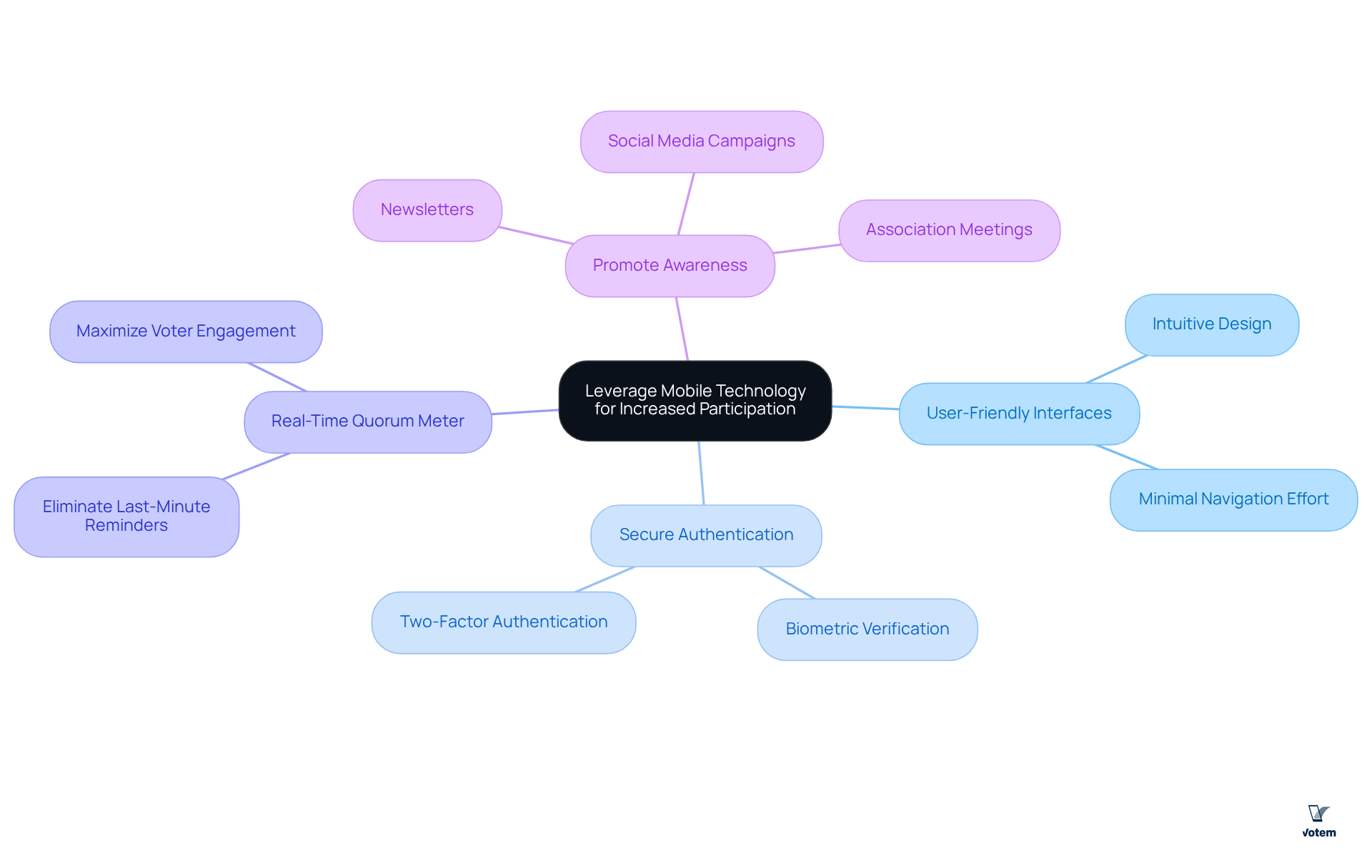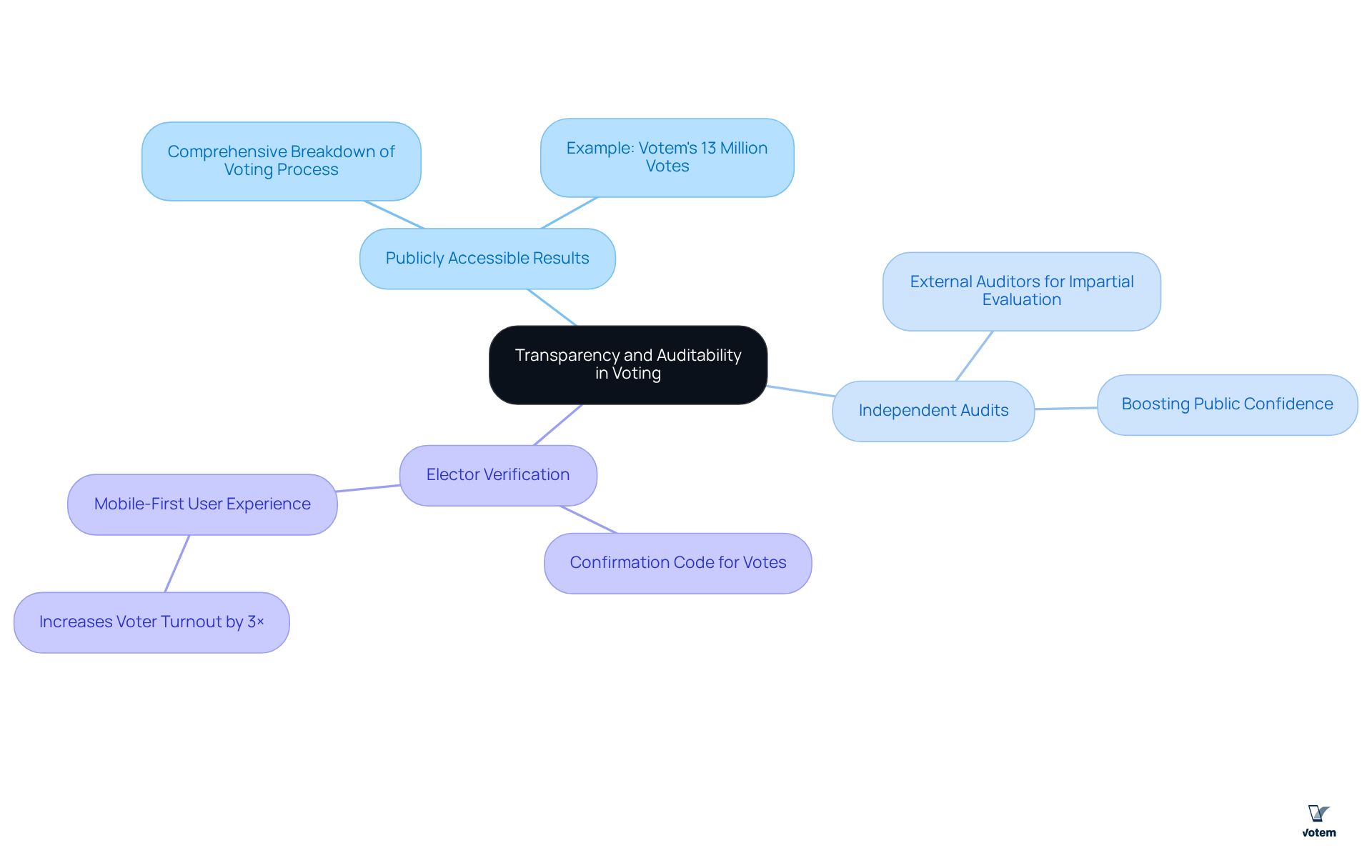Overview
To ensure secure voting in union elections, three key practices must be prioritized:
- Establishing compliance and security standards
- Leveraging mobile technology to boost participation
- Ensuring transparency and auditability throughout the voting process
These practices are critical as they enhance the integrity and trustworthiness of elections. Furthermore, the importance of data encryption, access controls, and independent audits cannot be overstated. Collectively, these measures not only protect the voting process but also promote higher voter engagement through user-friendly mobile platforms.
By implementing robust security standards, union leadership can foster an environment where voters feel confident in the electoral process. This confidence is essential for increasing participation rates, particularly when mobile technology is utilized effectively. In addition, ensuring transparency and auditability serves as a foundation for trust, allowing voters to see the integrity of the election firsthand.
Ultimately, embracing these practices will not only enhance the security of union elections but also empower voters, leading to a more engaged and participatory electorate. The path forward is clear: prioritize secure voting practices to uphold the democratic process within unions.
Introduction
In an era where trust in electoral processes is essential, ensuring secure and transparent voting in union elections is of utmost importance. This article explores three critical practices that not only bolster the security of the voting process but also encourage greater participation and trust among union members.
As unions confront the complexities of compliance and technological integration, a pressing challenge emerges: how can they effectively implement these practices to protect the integrity of their elections while engaging a diverse membership?
The answers lie in adopting robust strategies that resonate with every member, fostering a united front in the pursuit of transparent governance.
Establish Compliance and Security Standards
To guarantee safe votings in collective decisions, it is essential to establish robust compliance and security standards. This necessitates a comprehensive understanding of the Labor-Management Reporting and Disclosure Act (LMRDA), which mandates democratic practices in union elections. Unions must thoroughly evaluate their current election procedures to identify areas for enhancement to meet these standards. Key practices include:
- Data Encryption: All voter data and ballots must be encrypted both in transit and at rest, safeguarding against unauthorized access and ensuring the integrity of the voting process. encrypts every ballot, thereby enhancing security and fostering voter trust.
- Access Controls: Establishing stringent access controls is vital to ensure that only authorized individuals can manage the election system, thus reducing the risk of tampering. Votem’s CastIron platform adheres to stringent regulatory requirements, including NCUA, DOL, ERISA, and SOC 2, ensuring compliance with industry standards.
Regular audits of the votings process aid in pinpointing weaknesses and guarantee adherence to set standards, thereby strengthening the integrity of the voting procedure. In FY 2024, the Office of Labor-Management Standards (OLMS) resolved 83.3% of audit violations through voluntary compliance, emphasizing the importance of upholding high standards in workforce votings.
Furthermore, Votem’s mobile-first user experience can enhance participation rates by as much as three times on launch day, making the process more accessible and engaging for participants. By adhering to these practices, organizations can cultivate trust among their members and ensure that votings are conducted securely and in accordance with legal standards.

Leverage Mobile Technology for Increased Participation
Integrating mobile technology into collective elections stands to significantly enhance votings and increase voter turnout. Evidence suggests that mobile votings can elevate participation rates by up to three times compared to traditional methods, particularly through Votem’s mobile-first user experience. To fully leverage the advantages of mobile technology, unions should consider implementing the following strategies:
- User-Friendly Interfaces: Design mobile voting platforms to be intuitive and easy to navigate, allowing members to cast their votes with minimal effort.
- Secure Authentication: Utilize robust authentication techniques, such as biometric verification or two-factor authentication, to safeguard individual identities and uphold the integrity of the electoral process.
- Real-Time Quorum Meter: Introduce a real-time quorum meter to eliminate last-minute reminder calls, ensuring that voter engagement is maximized.
- Promote Awareness: Actively communicate the availability of mobile ballot casting through newsletters, social media, and association meetings, emphasizing its advantages and ease of use.
By embracing mobile technology, associations can foster a more inclusive environment for votings that encourages participation from all members, ultimately leading to more representative outcomes. Votem’s successful management of over 13 million votings underscores the effectiveness of these , significantly boosting turnout for events such as the National Radio Hall of Fame.

Ensure Transparency and Auditability in Voting
To maintain trust and integrity in union selections, it is essential to ensure transparency and auditability throughout the votings process. Key practices that unions should prioritize include the following:
- Publicly Accessible Results: After the election, results should be made publicly accessible to all members, accompanied by a comprehensive breakdown of the voting process. This openness fosters trust and allows members to understand how decisions were made. For instance, Votem has effectively handled over 13 million votes, showcasing its ability to deliver clear and accessible voting results.
- Independent Audits: Involving external auditors to examine the voting procedure and outcomes offers an impartial evaluation of the process’s integrity. Independent audits are crucial for confirming that the votings were carried out fairly and in line with established guidelines. This practice has been demonstrated to boost public confidence, as observed in several successful elections overseen by Votem.
- Elector Verification: Implementing systems that allow individuals to confirm that their votes were cast and counted accurately is essential. For example, offering a distinctive confirmation code after casting a ballot can significantly enhance confidence in the process. Votem’s mobile-first user experience can by up to 3× on launch day, further emphasizing the importance of voter engagement and verification.
By prioritizing these practices, unions can significantly enhance member confidence in the electoral process, thereby reducing the likelihood of contested elections and fostering a culture of accountability. However, it is also important to be aware of common pitfalls, such as failing to communicate the verification process clearly or neglecting to follow up on audit recommendations, which can undermine the effectiveness of these practices.

Conclusion
Establishing secure voting practices in union elections is paramount to fostering trust and ensuring the integrity of the electoral process. By implementing comprehensive compliance and security standards, unions can create a voting environment that not only adheres to legal requirements but also encourages active participation from all members.
The article highlights three key practices that contribute to secure voting:
- Establishing robust compliance and security standards
- Leveraging mobile technology to enhance participation
- Ensuring transparency and auditability throughout the voting process
Each of these practices plays a critical role in safeguarding voter data, increasing accessibility, and building confidence among union members. Furthermore, the integration of mobile technology has demonstrated significant potential to boost voter turnout, making the voting process more engaging and inclusive.
Ultimately, the commitment to secure voting practices in union elections is not just about compliance; it is about empowering members and fostering a culture of accountability and transparency. By prioritizing these practices, unions can enhance the democratic process within their organizations, ensuring that every voice is heard and respected. Embracing these strategies will not only lead to more secure elections but also strengthen the overall trust in union governance, paving the way for a more engaged and informed membership.
Frequently Asked Questions
Why is it important to establish compliance and security standards for voting in collective decisions?
Establishing compliance and security standards is essential to guarantee safe voting in collective decisions, ensuring adherence to democratic practices as mandated by the Labor-Management Reporting and Disclosure Act (LMRDA).
What does the Labor-Management Reporting and Disclosure Act (LMRDA) require?
The LMRDA mandates democratic practices in union elections, requiring unions to evaluate their election procedures and identify areas for enhancement to meet compliance and security standards.
What are key practices for ensuring secure voting?
Key practices include data encryption to protect voter data and ballots, establishing stringent access controls to limit system management to authorized individuals, and conducting regular audits of the voting process to identify weaknesses and ensure adherence to standards.
How does Votem enhance the security of the voting process?
Votem’s platform encrypts every ballot, ensuring that all voter data and ballots are protected against unauthorized access, thereby enhancing security and fostering voter trust.
What role do access controls play in the voting process?
Access controls are vital to ensure that only authorized individuals can manage the election system, which reduces the risk of tampering and enhances the integrity of the voting process.
How effective are regular audits in maintaining voting standards?
Regular audits help pinpoint weaknesses in the voting process and ensure adherence to compliance standards. In FY 2024, the Office of Labor-Management Standards (OLMS) resolved 83.3% of audit violations through voluntary compliance, highlighting their importance.
How can Votem’s mobile-first user experience affect participation rates?
Votem’s mobile-first user experience can enhance participation rates by as much as three times on launch day, making the voting process more accessible and engaging for participants.
What is the overall benefit of adhering to compliance and security practices in voting?
By adhering to these practices, organizations can cultivate trust among their members and ensure that voting is conducted securely and in accordance with legal standards.
List of Sources
- Establish Compliance and Security Standards
- Electing Union Officers Using Remote Electronic Voting Systems (https://dol.gov/agencies/olms/compliance-assistance/tips/remote-electronic-voting-systems)
- electionbuddy.com (https://electionbuddy.com/blog/2023/10/20/union-voting-election-rules)
- hrbdf.org (https://hrbdf.org/case_studies/product-misuse/product_misuse/addressing_the_misuse_of_telecommunications_technology_in_iran.html)
- dol.gov (https://dol.gov/agencies/olms/about/annual-reports/2024)
- Leverage Mobile Technology for Increased Participation
- news.uchicago.edu (https://news.uchicago.edu/story/voting-mobile-devices-increases-election-turnout)
- Ensure Transparency and Auditability in Voting
- surveyandballotsystems.com (https://surveyandballotsystems.com/blog/best-practices/providing-transparent-elections)
- electioninnovation.org (https://electioninnovation.org/update/how-do-post-election-audits-boost-confidence-in-election-results)
- Labor union election outcomes U.S. 2023| Statista (https://statista.com/statistics/1374939/labor-union-election-outcome)
- Improving Trade Union Election Transparency – ElectionBuddy (https://electionbuddy.com/blog/2024/06/24/improving-trade-union-election-transparency)

